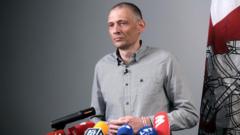After an unexpected release from prison, Sergei Tikhanovsky, husband of Belarusian opposition leader Svetlana Tikhanovskaya, urges US President Trump to intervene for the hundreds of political prisoners still held captive in Belarus. His emotional plea highlights the dire conditions faced by detainees under the authoritarian rule of President Alexander Lukashenko.
Husband of Belarus Opposition Leader Appeals to Trump for Political Prisoners' Freedom

Husband of Belarus Opposition Leader Appeals to Trump for Political Prisoners' Freedom
Sergei Tikhanovsky, released Belarus opposition leader, beseeches President Trump for aid in liberating political detainees.
In a remarkable press conference held in Vilnius, Lithuania, Sergei Tikhanovsky, who was imprisoned for five years due to his activism against the Belarusian regime, made a heartfelt appeal to US President Donald Trump, urging him to utilize his influence for the release of all political prisoners in Belarus. Tikhanovsky, who was unexpectedly freed along with thirteen other prisoners, described the torturous conditions he endured, detailing his isolation from the outside world during his five-year confinement.
Initially arrested in 2020 while planning to contest President Lukashenko, Tikhanovsky was sentenced to 18 years in prison in 2021 for supposedly inciting mass protests against the regime. His emotional resurfacing was marked by the visible toll prison life had taken on him, both physically and mentally. "You don't even get letters, not a single call," he stated, fighting back tears. "It's a nightmare... When you ask about torture, is that not torture?"
He directly addressed Trump during the press conference, stating that with one word, the US president could effectively initiate the release of all political detainees in Belarus. His passionate demands for freedom also extended to an appeal for the removal of US sanctions against Belarus—an acknowledgment that the Lukashenko regime could use diplomatic maneuverings for its own gain.
Svetlana Tikhanovskaya, who temporarily took over her husband’s political mantle, also expressed her distress over the changes in her husband's appearance and health, emphasizing the profound effects of his imprisonment on their family. Tikhanovskaya underscored the complex geopolitics in play, noting that the recent visit from the US envoy Keith Kellogg to Minsk might be framed as a diplomatic achievement by Lukashenko, elevating his standing at a time of growing international disdain.
Despite his horrific experiences, Sergei Tikhanovsky expressed pride in his activism and solidarity with Belarus's struggling citizens. He declared himself as a symbol of resistance, urging the population to continue standing against Lukashenko's regime. "If you were waiting for a symbol, this is it," he said with defiance, emphasizing the urgency of collective action.
The call for the release of political prisoners in Belarus comes against a backdrop of mass arrests and human rights violations that have characterized the regime's response to dissent since 2020. As the Tikhanovskys navigate their new reality, the future of political freedom in Belarus remains uncertain, with continued calls for global awareness and intervention to support those still fighting against repression.
Tikhanovsky's emotional return and appeals serve as a reminder of the dire circumstances faced by many political prisoners while emphasizing the critical role international solidarity can play against authoritarianism.
Initially arrested in 2020 while planning to contest President Lukashenko, Tikhanovsky was sentenced to 18 years in prison in 2021 for supposedly inciting mass protests against the regime. His emotional resurfacing was marked by the visible toll prison life had taken on him, both physically and mentally. "You don't even get letters, not a single call," he stated, fighting back tears. "It's a nightmare... When you ask about torture, is that not torture?"
He directly addressed Trump during the press conference, stating that with one word, the US president could effectively initiate the release of all political detainees in Belarus. His passionate demands for freedom also extended to an appeal for the removal of US sanctions against Belarus—an acknowledgment that the Lukashenko regime could use diplomatic maneuverings for its own gain.
Svetlana Tikhanovskaya, who temporarily took over her husband’s political mantle, also expressed her distress over the changes in her husband's appearance and health, emphasizing the profound effects of his imprisonment on their family. Tikhanovskaya underscored the complex geopolitics in play, noting that the recent visit from the US envoy Keith Kellogg to Minsk might be framed as a diplomatic achievement by Lukashenko, elevating his standing at a time of growing international disdain.
Despite his horrific experiences, Sergei Tikhanovsky expressed pride in his activism and solidarity with Belarus's struggling citizens. He declared himself as a symbol of resistance, urging the population to continue standing against Lukashenko's regime. "If you were waiting for a symbol, this is it," he said with defiance, emphasizing the urgency of collective action.
The call for the release of political prisoners in Belarus comes against a backdrop of mass arrests and human rights violations that have characterized the regime's response to dissent since 2020. As the Tikhanovskys navigate their new reality, the future of political freedom in Belarus remains uncertain, with continued calls for global awareness and intervention to support those still fighting against repression.
Tikhanovsky's emotional return and appeals serve as a reminder of the dire circumstances faced by many political prisoners while emphasizing the critical role international solidarity can play against authoritarianism.





















